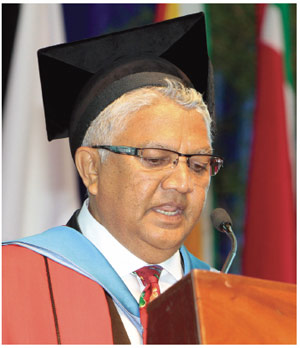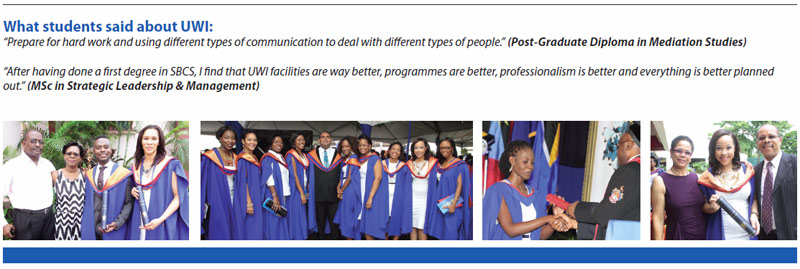 |
 |
 |
|
December 2014 |
Citation: Subesh Ramjattan, Degree of Doctor of Letters (DLitt)Chancellor, over the last two decades, Subesh Ramjattan has devoted his life to public philanthropic service to mainly underprivileged persons in the society. His abiding empathy may well have its roots in his own very humble upbringing in the rural community of Plum Mitan in north-eastern Trinidad. Early on, he knew that starting his own business was something he wanted to achieve. After attending secondary school at North Eastern College in Sangre Grande, he sought employment for the kind of schooling one can only acquire in the working world. And he took to that world with considerable energy, first at the Bata Shoe Company in Port of Spain and then with the Neal and Massy Group. Being in possession of ample humility and sharply tuned powers of attention, he learnt quickly and thoroughly. Many are the hats he wore during that time: Stock Keeper, Customs Clerk, Purchasing and Costing Clerk, Production Supervisor, Accounts Clerk, Purchasing Manager and Route Sales Manager. By 1976, aged 25, he launched his first business venture. The House of Marketing Limited was borne from his observations of business opportunities and his own imagination. He filled a niche supplying and installing acoustical and flooring products. He subsequently developed six further divisions catering to building and home improvement needs. Expansion would ultimately take him to the United States where a new stage of his development would begin to take shape. In 1980, he created North American Carpet Mills and subsequently achieved a level of financial security that supported his calling to community service. In 1998 he would pick up the challenge of caring for abandoned and underprivileged children with the establishment of the Bridge of Hope Foundation in the rural community of James Smart Village, east of Sangre Grande. The Foundation acquired 18 acres of land and developed dormitories, classrooms, a playing field and an agricultural plot. Today, 30 children call it home and with help from corporate organisations, courses are offered in cosmetology, computer literacy, animal and plant husbandry as well as academic subjects needed for entrance into secondary schools in the area. This serves to underscore his deep belief in supporting communities by truly empowering people. The Foundation also developed Olive House on the same compound which provides a haven for retired persons who are in need of professional care in their senior years. The obvious synergies of this arrangement continue to benefit young and old. In 1998, Subesh Ramjattan began the development of the Annapausis Community in St. Augustine, Trinidad. Here he established a meeting place for members of the public desirous of engaging in a faith-based model of philanthropy, mentoring and coaching. The site has become an advisory centre for marital counseling and family-life guidance. It also functions as the Headquarters of the Oasis Institute of Higher Learning which is a State-recognised centre for programmes in social work. Mr Ramjattan has chaired the Oasis Board since 2002. Prior to that, he partitioned his time to pursue a programme in pastoral training at the Kingsway Biblical Institute in Iowa and was ordained as a Minister of Religion in 1999. In 2009, Mr Ramjattan pushed further into rural Trinidad to create the Kernahan Centre for Community Development in Manzanilla. With the support of state and corporate sponsors he was able to build the Centre which houses a pre-school, homework and computer facilities and an outreach programme for the agriculturally-sustained population from the area. Exploring a need to share his experiences and insights, Mr Ramjattan has authored several books and recently established Bridge of Hope (Kutumb Jyothi) India to assist families in impoverished areas. He has consistently demonstrated a belief that there are lessons to be learnt from all those around us. He has charted his life’s path to empower himself not as an end to itself but as a means to serve the national community with distinction and to teach by example. Chancellor, I present Subesh Ramjattan, and ask that by the authority vested in you by the Senate and Council of The University of the West Indies, you confer on him the degree of Doctor of Letters, honoris causa.
Many professionals have become accustomed to the “moral darkness” and often do not see the specific needs of the community around them. Yet the dire need to enforce solid morality and ethics, charity and generosity in support of the needy compels us to take back the moral high ground clearly held by those who established this Nation. Since you are launching a career in the field of medicine, I challenge you to both review and honour the oldest binding document in your historic field of study, the Hippocratic Oath. It is a system of moral principles that applies values and judgments to the practice of medicine, a most honourable profession. Those with expertise and resources must join the effort to make moral citizens of the children, and solicit the assistance of the business community and non-profit entities to join the government to meet the needs of all citizens. We must utilise the expertise and energy of all professions in assisting the present and the next generation. It is immoral to avoid this responsibility; it is less than humane to fail in our responsibility to the generation that brought us into this world, invested in our growing years, gave us a moral compass, provided the encouragement for an adequate education, and gave us a boost to grow into productive citizens. To withhold care or resources from children, the poor and needy seniors is a gross injustice and a moral blight on any society. We must take back the moral high ground! My personal concern for the less fortunate came from frequent statements by my mother; she would often say things like: "Never look down at someone unless you are willing to help them get up." This instilled in me a passionate commitment to assist the less fortunate, especially neglected children, dysfunctional families, those with limited access to higher education, and the elderly in need of housing and care. I see this as a moral obligation. All professionals should remember that opportunity equals obligation. Perhaps the historic professions of religion, law and medicine have the most opportunities to meet this moral obligation. One must never pass up an opportunity to assist others on their journey. My life’s experiences have taught me that I should never burn bridges since I will never know which one I will need to cross someday. We must all develop a sense of duty and responsibility to take back the moral high ground so nobly established by the early leaders of this nation. We owe a debt for our own upbringing. Not just a sense of indebtedness, but a grateful heart for family, the opportunity for education, good friends and a stable government. We must all become aware of the opportunities around us to make a difference. And remember, you don’t have to make news headlines to make a difference in the lives of others, the theme of my book “God’s work done God’s way.” “Keep on Keeping On” is a song on the album, Roots written by Curtis Mayfield and released in 1971. He was a song writer in the early civil rights movement who focused his lyrics on social problems and personal responsibility. A typical verse in his lyrics goes like this:
Curtis Mayfield was telling his generation to take a stand for what was right. He was warning them not to run from the burdens or responsibility of the clear task at hand. His challenge was to continue to give and continue to live for what they knew was right. In other words, Curtis’ music was an ethical and moral challenge to the current generation to keep moving forward with the push for equality and to make a difference by doing what was lawful and right. As medical graduates and our nation’s future health experts, your mandate is one of healing and care. An important part of healing is developing compassion, espoused by Fredrick Beuchner: “To find your mission in life is to discover the intersection between your heart’s deep gladness and the world’s deep hunger.” I ask you, what is your heart’s desire, what will fulfill that desire and will that desire also feed the world? Each of you have reached this far and are on the precipice of a new journey. And each journey begins with a first step. In reality it is the little things that count in life. When the first man landed on the moon, he said, “One small step for (a) man; one giant leap for mankind.” It took decades of planning and labour, with many people working long hours to put that machine and that man on the moon. They paid the price, did the work, and made a significant contribution to mankind. That is where we stand in the Republic of Trinidad and Tobago today. Will you join the men and women of good will and take the necessary steps to move forward? Will you encourage the government to do their part? Will you make a cooperative and concerted effort to take back the moral high ground and move our people and our nation forward into the “light” of reality? Dare we do less? There is a story about an old man in a small town, who was called the Lamplighter. Early each night he would go to each street corner and light the gas lamp. The old gas lamps made only a small light on the dark street. As the Lamplighter went from street to street it appeared that he was knocking holes in the darkness. This is an example of what one person can do. And a good example of what one in the medical profession can do as they strive daily to knock holes in the darkness and enlighten those they serve. The big questions today are simple: What can you do differently? Or, perhaps a better question would be: What will you do to make a difference in the lives of those you serve and ensure the health and prosperity of this nation? I leave you with one of my favorite quotes from the wisdom of Mahatma Gandhi: “The best way to find yourself is to lose yourself in the service of others.” He also said that: “Man becomes great exactly in the degree in which he works for the welfare of his fellowman.” My encouragement to you is that you were born to win, but to be a winner you must plan to win, prepare to win, and expect to win. In life we have three choices: give up, give in or give it all you have. You are about to experience the life you can’t wait to live, one filled with passion, peak performance and purpose. Passion is a pre-requisite for peak performance. John Dewy, an American educator and political activist, said: “Education is not a preparation for life, education is life itself.” From what we earn, we can make a living, what we give however, makes a life. My personal life’s philosophy is, It’s not what you gather; it’s what you scatter that makes the difference. Use your education to serve, give and make a life. Finally, be reminded by Nelson Mandela: "What counts in life is not the mere fact that we have lived, it is what difference we have made to the lives of others that will determine the significance of the life we lead." My challenge and reflection to guide your journey is, what will you want your legacy to be when you look back on your life many years from now? The difference between school and life is that school teaches you lessons and gives you a test. Life gives you a test and you learn the lessons. May Providence guide you personally and empower your professional journey.
|




